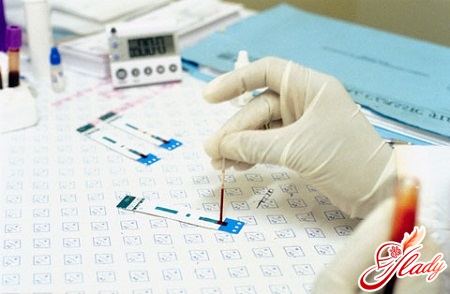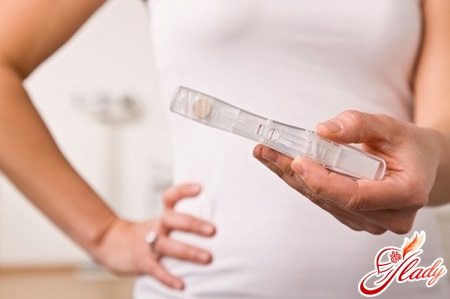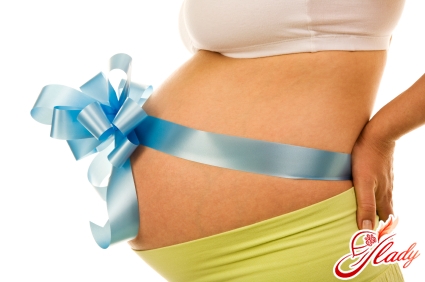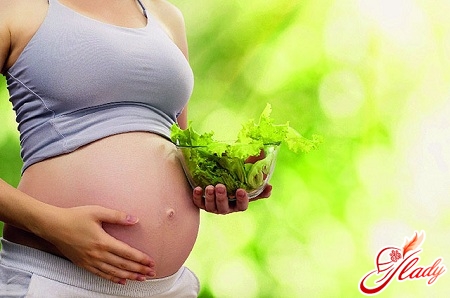 If you are a vegetarian, you canbe puzzled during pregnancy. How to be? Is it normal to stick to a vegetarian diet during pregnancy? You will surely come across a situation where numerous relatives and friendly friends will unanimously affirm that vegetarianism is unacceptable during pregnancy. And the woman begins to doubt. Is it possible that vegetarianism and pregnancy are incompatible concepts? However, in reality this is not true. In fact, even doctors agree that vegetarianism during pregnancy does not harm mother or baby in any way. Moreover - there are many health benefits that are associated with the reception of vegetarian food. And during pregnancy, including - because the body of a pregnant woman is particularly sensitive and vulnerable. Slightly more than two percent of Russians regularly adhere to a vegetarian diet. And most women - vegetarians still prefer to follow a vegetarian diet and during pregnancy. Vegetarianism and pregnancy - this is exactly what we are talking about today.
If you are a vegetarian, you canbe puzzled during pregnancy. How to be? Is it normal to stick to a vegetarian diet during pregnancy? You will surely come across a situation where numerous relatives and friendly friends will unanimously affirm that vegetarianism is unacceptable during pregnancy. And the woman begins to doubt. Is it possible that vegetarianism and pregnancy are incompatible concepts? However, in reality this is not true. In fact, even doctors agree that vegetarianism during pregnancy does not harm mother or baby in any way. Moreover - there are many health benefits that are associated with the reception of vegetarian food. And during pregnancy, including - because the body of a pregnant woman is particularly sensitive and vulnerable. Slightly more than two percent of Russians regularly adhere to a vegetarian diet. And most women - vegetarians still prefer to follow a vegetarian diet and during pregnancy. Vegetarianism and pregnancy - this is exactly what we are talking about today.
Types of vegetarianism
First, let's try to figure out whatis vegetarianism and how it happens. After all, it is very, very important to determine whether it is worth sticking to vegetarianism while waiting for the baby. So:
- Veganism. With this type of diet is allowed to take food exclusively of vegetable origin, and nothing more.
- Uneven vegetarianism. In addition to plant foods, seafood is allowed.
- Lactovegetarianism. This type of diet allows the use of dairy products.
- Raw food. This type of vegetarianism is the most severe and severe. The menu can consist only of food of vegetable origin, and only in raw form.
In the case of pregnant womenwomen, doctors advise to give preference to either lactovegetarianism or nonstrict. Ideally, it is worth to slightly diversify your menu, including dishes from both types of vegetarianism. 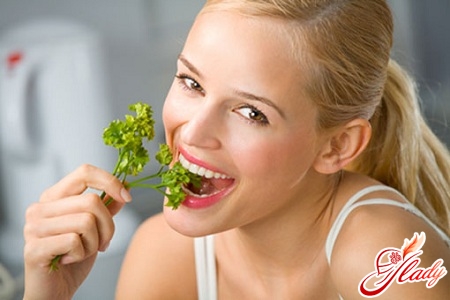
Is protein deficiency a myth or a reality?
The most important concern of any woman,fond of vegetarianism - will her body and the baby's body with such a diet get enough protein during pregnancy? However, all the same dietitian doctors unanimously assert that these fears are vain and groundless. Probably, this is the biggest myth about vegetarianism. Vegetarians tend to eat a lot of protein. Meat is not the only form of protein. Moreover - it is the meat eaters who eat much more protein than the body needs them. And this is no less dangerous than a lack of protein. Therefore, the question of the protein is very controversial. Although, for the sake of justice, it should be noted that the protein is really vital for the normal course of pregnancy. Protein is very important for your child, for his actively developing brain and nervous system. Doctors recommend that pregnant women consume about 60-70 g of protein. This is easily achieved by eating products such as soy milk, legumes, nuts, or alternative meat substitutes such as soy patties.
Lack of calcium - is it possible?
Another very important substance thatit is necessary for the future mother - this is calcium. How do vegetarians get enough calcium during pregnancy? After all, pregnant women should eat about 1200 mg of calcium per day. Calcium is necessary for your body, as well as for the full development of your child. Most of the calcium is found in foods such as milk, cheese and green leafy vegetables. As you can see, almost every vegetarian diet almost completely replenishes the daily requirement of the body for calcium. But since the future mother of calcium needs much more, dietitian doctors advise mandatory include dairy products. Just one glass of milk or kefir and one yogurt per day - and you can forget about the lack of calcium.
Iron-deficiency anemia
Another urgent issue is whether it is true thatAre vegetarians more likely than others to lack iron during pregnancy? As you know, pregnant women should consume about 30 mg of iron per day. And in case a woman adheres to a vegetable-milk diet, getting such a quantity of iron will not be so easy. If you do not want meat to be included in the ration, you should include in your menu as many permissible products as possible, which contain a large amount of iron. Such products include buckwheat, apples, pomegranate juice. By the way, do not be very addicted to pomegranate juice. It can provoke the development of acute gastritis. And do not forget to rinse your mouth after each intake - on the enamel of enamel the pomegranate juice also acts in a very unfavorable way. And in fact a teeth during pregnancy and so are under potential threat. In general, it is worth noting that iron deficiency anemia is a common problem during pregnancy - regardless of the menu of the future mother. Your doctor, most likely, in any case in the second or third trimester of pregnancy will appoint you some vitamin-mineral complex, which will include iron. Otherwise, whatever menu you choose, avoiding a shortage of iron will be very, very difficult. 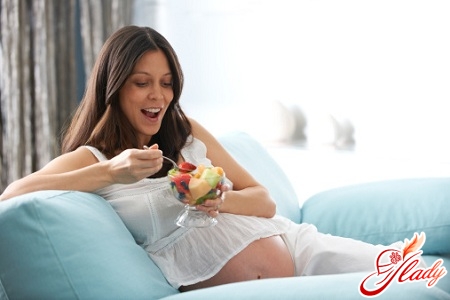
What about vitamin B-12?
Another substance that is by no meansyou can not ignore - it's vitamin B-12. Vitamin B-12 is essential for cell division and protein synthesis. Pregnant women should eat about 2.6 mg of vitamin B-12 per day. Otherwise, the woman's well-being will significantly deteriorate. Fatigue, drowsiness, irritability - this is far from a complete list of symptoms of a shortage of this vitamin. And on the development of the child, the deficit of this vitamin will affect the most unfavorable way. Most of the vitamin B12 is found in foods of animal origin - for example, in the heart, kidneys, liver. But as the use of these products with vegetarianism is excluded, future mothers should pay attention to seafood. Most of the vitamin B12 is found in lobsters, scallops and oysters, as well as fish such as sardines and all salmonids. In smaller quantities, but still you can find vitamin B12 and in dairy products - kefir, milk and hard cheeses. Fortunately, all of the above products do not lose their useful properties, even with prolonged heat treatment. Therefore, the future mother can safely include in her diet meals from seafood, fish, as well as dairy products. As a rule, the basic need for this vitamin is satisfied even with vegetarianism. Although in this case, one should not forget about multivitamin complexes.
Folic acid
About how important is folic acid duringpregnancy, you do not have to say - surely there will not be a single future mother who does not know this. It is folic acid that plays an important role in the formation of your child's neural tube. But it is on how correctly it will be formed, all the subsequent development of the baby depends. Simply put, it is folic acid that determines the further course of pregnancy. Your diet during pregnancy should contain about 600 mcg of folic acid. Therefore, it is very important to ensure that the diet contains a large amount of folic acid. Fortunately, vegetarianism does not have to resort to much effort to achieve this. Folic acid is found in large quantities in foods such as leafy vegetables, nuts, whole-wheat bread and cereals. Vegetarians, as a rule, have no problems with folic acid - their diet completely covers the needs of the pregnant woman's body. As you can see, vegetarians can also be absolutely healthy during pregnancy. Of course, with the proper planning of your diet. Of course, you will need some time to reconsider your diet. And remember that you can always discuss any problems with your doctor or midwife. In addition, you will come to the aid of a dietitian, who will help to choose the optimal diet. After all, pregnancy and vegetarianism do not completely exclude each other! We advise you to read:




